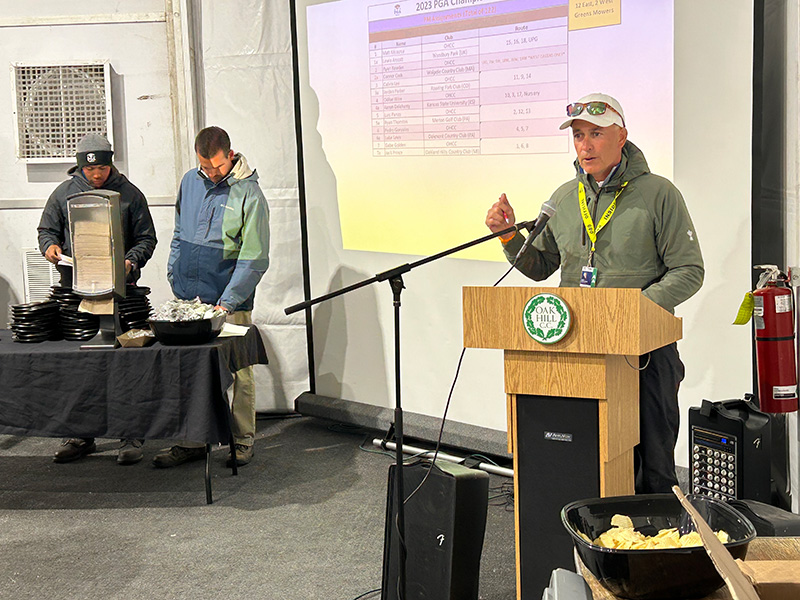
Jeff Corcoran, GCSAA Class A manager of golf courses and grounds at Oak Hill Country Club in Rochester, N.Y., speaks to volunteers ahead of the 2023 PGA Championship. Photo by Scott Hollister
Leadership and public speaking are intrinsically connected.
Leaders have long been delivering speeches to sway hearts and minds. Many of the earliest histories are full of recounting of such speeches. It’s hard not to see human history as a connection of stars, a collective of personalities whose constellation points to the power of public speaking.
Though speaking to a crowd often is one of our greatest fears, having the ability to deliver an effective speech will always be an invaluable asset for turf managers. Whether it be to your crew in the morning meeting or in front of a green committee to outline a plan for a major renovation, it’s a skill we should all be working on.
After spending many years reading about this quality in history’s great leaders and observing it firsthand from the superintendents and assistants I’ve worked with, it was time to give it a shot: It was time to face my fears.
One of the most prominent expressions of imposter syndrome can manifest in the prospect, or the act, of public speaking. The resultant anxiety can happen to anyone. I believe the ultimate goal of a leader should be to maintain a mindset of general hope and optimism, even when things get tough. This mindset is internalized in how a leader sees themselves and externalized in how they see everyone around them. Seeing oneself and one’s teammates in this way despite any perceived negatives can be a key to projecting an intangible charisma, energy or positive vibe. What results is an almost instinctive urge in others to follow — not because they have to, but because they want to. And, when the going gets tough, people want to look to someone who maintains that same hope for better times ahead.
Like refueling a fire, a leader must work to maintain their mindset and the resultant energy. For many of us in leadership positions, one of the hardest parts in keeping it going is getting over the anxiety and intimately connected imposter syndrome of public speaking.
A few years ago, I heard about Toastmasters International. It wasn’t hard to notice the change in some of my colleagues after they joined Toastmasters. There was a distinct difference in their confidence to communicate and deliver an effective speech. After some time hesitating and making excuses, I started to look into how to join a club.
Since 1924, Toastmasters has been helping individuals become better public speakers and consequently more effective leaders. There are clubs all over the world and leaders ready to help those who want to work on their speechcraft.
Although we may hold our own beliefs about the mindset of a leader, we aren’t always able to personify our own vision, mission and values in the way we want or the way we think we are. Toastmasters provides the good opportunity to practice this outward personification of oneself as a leader.
Many of the individuals that we’re leading as turf managers are young and impressionable. Many are just there for a summer job. Like anything else, there are pros and cons to working with and leading younger generations. But, if we’re adopting a leadership mindset of general positivity and hope, the pros heavily outweigh the cons. Although they may require more direction and output of energy in the form of ongoing communication, development of a strong training program and other systems and processes to help guide them, many of these individuals will go through a metaphorical wall for the right leader.
There’s a great opportunity (and responsibility) for turf managers to help shine a light on what can be a particularly difficult part of these younger individuals’ lives. We’ve all been there, and it never really goes away. Many of us can remember feeling this lack of direction and how it affected us in our younger years. Therefore, it’s important for superintendents and assistant superintendents to work on getting past our own anxieties and insecurities. In this way, when the opportunity to speak to the team or a green committee does arrive, we’re able to project real charisma, energy or a positive vibe that people want to follow.
Whether in a group setting or in a one-on-one conversation, transferring any internal negative energy into positive energy is the first step to being able to project the kind of leadership we want — one that people want to follow.
After only a few Toastmasters club meetings, I feel like I’m already making positive strides toward becoming more like the leader and communicator I want to be. Putting in the work and remaining in this hopeful and positive mindset, we can all continue to narrow the gap between our own vision of ideal leadership versus what others may be seeing and hearing.
Mark Wiebe is the assistant superintendent at Oakdale Golf & Country Club in Toronto. He is a nine-year member of GCSAA.